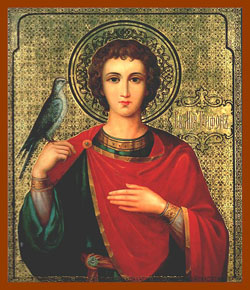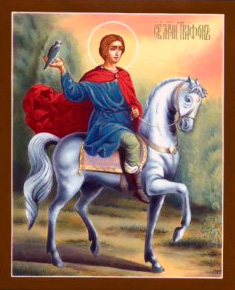|
On February 14th (the 1st by the old calendar) the Church commemorates the holy martyr Tryphon.
St. Tryphon was born in the 3rd century A.D. in Phrygia (a province in Asia Minor), in the town of Apamia. From his early years the grace of God was upon him, and he was endowed with miraculous powers: he was able to cure illnesses and exorcize evil spirits. Thus, for example, in 238 A.D. the Roman Empire came under the rule of Emperor Gordian, who was a pagan but did not persecute Christians. The Emperor had a daughter, the beautiful Gordiana, who was courted by many kings and noblemen. However, a great disaster befell this maiden: she became possessed by a demon who tormented her cruelly, throwing her into fire and water, and none of the court physicians could help her in any way. But at one point the evil spirit himself cried out: “No one can expel me from here except the youth Tryphon.” The king then straightaway sent his people to search for Tryphon. Many young men of that name were brought before the king, but none of them were able to exorcize the demon. Finally saint Tryphon was found in Phrygia, tending a flock of geese at a lake, and was brought to Rome.
As the saint approached Rome, the demon began to torment the king’s daughter even more, and cried out: “I cannot live here anymore, because Tryphon is approaching, and will arrive here on the third day, and I can no longer bear it.” Crying thus, the evil spirit left the maiden. On the third day, when saint Tryphon arrived in Rome, he was greeted warmly by the king, who asked him, however, to show everyone the demon in visible form. The saint agreed and spent six days in prayer and fasting, after which he attained even greater power over the evil spirits. On the seventh day the king and his courtiers came to Tryphon to see the demon. Then the saint, calling upon the name of our Lord Jesus Christ, ordered the devil to show himself visibly. Immediately the demon appeared before them in the form of a black hound with fiery eyes. Tryphon asked the demon: “Who sent you, demon, and how did you dare enter into this maiden, one of God’s creatures, when you yourself are so hideous and vile?” The devil replied: “I have been sent by my father, Satan, who stays in hell and who ordered me to torment this maiden. We have no power over those who know God and who believe in His Son, Jesus Christ, – we run away in fear from such people, and only when we are allowed, we approach them with external temptations. As for people who do not believe in God and the Son of God, and who please us with their passions, – over those people we receive absolute power to torment them. And what pleases us is the following: idolatry, blasphemy, adultery, witchcraft, envy, murder, vanity; with these and similar sins people ensnare themselves as in a net, alienate themselves from God, and together with us suffer eternal torment.”
Hearing this, the Emperor and all those who were present were struck with great fear, and many of them came to believe in Christ, while the faithful joyfully gave glory to God. The Emperor magnanimously rewarded the saint and sent him home in peace, but Tryphon gave away everything to the poor along the way, and returned to his homeland to continue his former pious way of life.
After Gordian the Roman Empire was briefly ruled by Philip, who was succeeded by the ferocious Decius, who initiated a savage persecution of Christians. During this persecution St. Tryphon was also taken prisoner and brought before the Roman ruler of his province, being accused of having used his powers of healing to convert many people to Christianity. The ruler tortured Tryphon most cruelly and at great length, but the saint endured the torture with joy and was finally beheaded, earning the crown of martyrdom
Part of St. Tryphon’s relics were kept in Moscow, in a church bearing his name. The building of this church was occasioned by the following event: one time the favorite falcon of Czar Ivan the Terrible flew away, due to a blunder on the part of the royal falconer, Tryphon Patrikeyev. The Czar ordered his falconer to find the missing falcon without fail in three days, otherwise he would be executed. The falconer crisscrossed the entire forest, but was unable to find the falcon. On the third day, tired and weary, he stopped near a grove and from sheer exhaustion fell asleep under a tree. Before that Patrikeyev had earnestly prayed to St. Tryphon, his patron saint, for help. Then the falconer saw a wondrous dream: a handsome youth on a white horse appeared before him, holding the royal falcon on his hand. “Take your missing bird back to the Czar, – he said, – and Godspeed, do not despair.” The falconer awoke and in astonishment saw the royal falcon sitting on his hand. Patrikeyev then took the falcon to Ivan the Terrible and told the Czar about his vision. The Czar left off his wrath and looked upon his falconer with great favor, and in gratitude to God and his patron saint for saving his life, Tryphon Patrikeyev built a church in honor of St. Tryphon on the very spot where he had seen his vision. From that time St. Tryphon has often been depicted on icons as a youth on a white horse, holding a falcon.
Additionally, the Church has established a special moleben, containing the “exorcism of St. Tryphon,” which is served in the fields and vineyards, in order to rid them of harmful snakes and insects. This church rite is based upon the following event in the life of the saint: when Tryphon was still a youth, harmful snakes and insects appeared in his native village, devouring all the grains, leaves, and grass, so that the villagers began to suffer from famine. St. Tryphon prayed to God, asking Him to send an angel to destroy the harmful insects and, moreover, the saint himself used a special exorcism to remove them to inaccessible places, where they could no longer bring any harm to people.
|